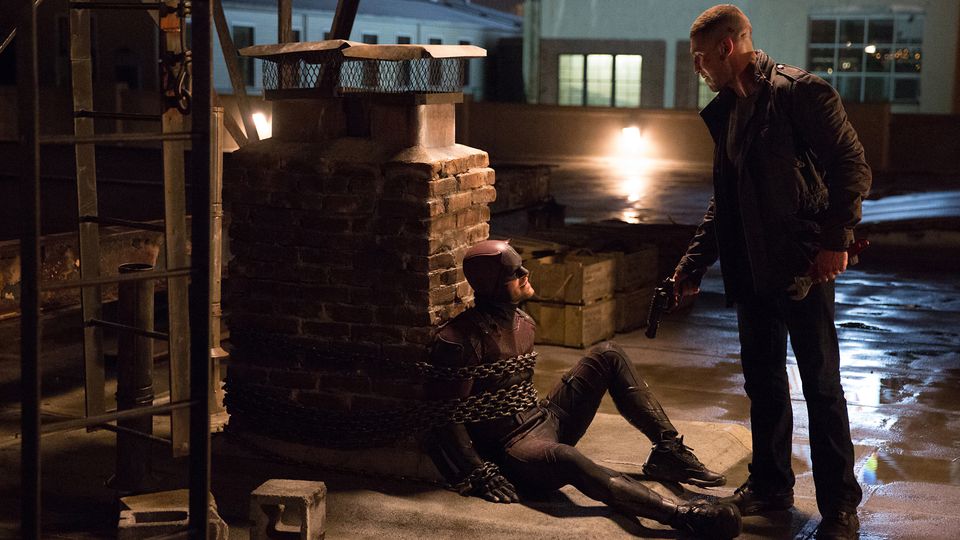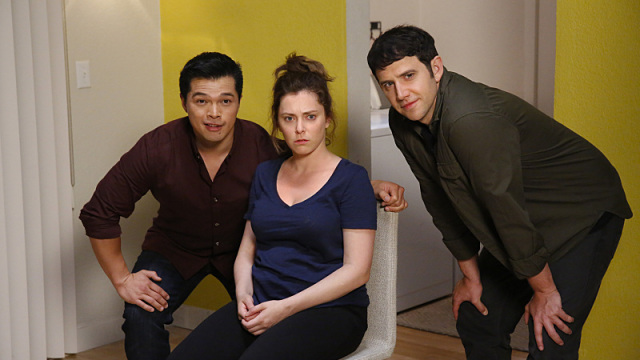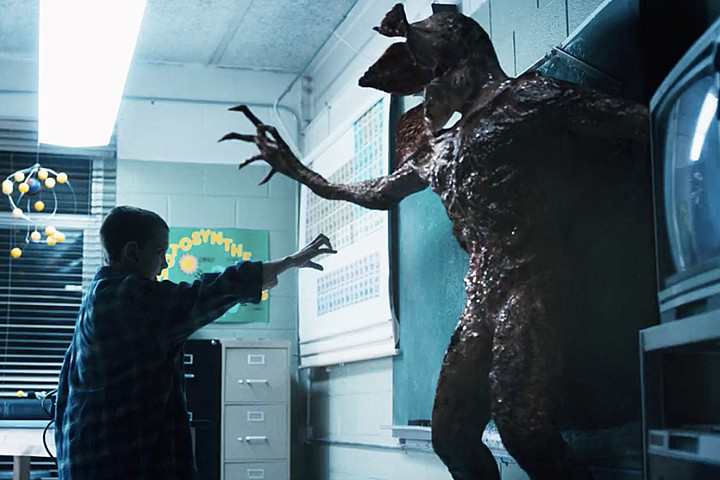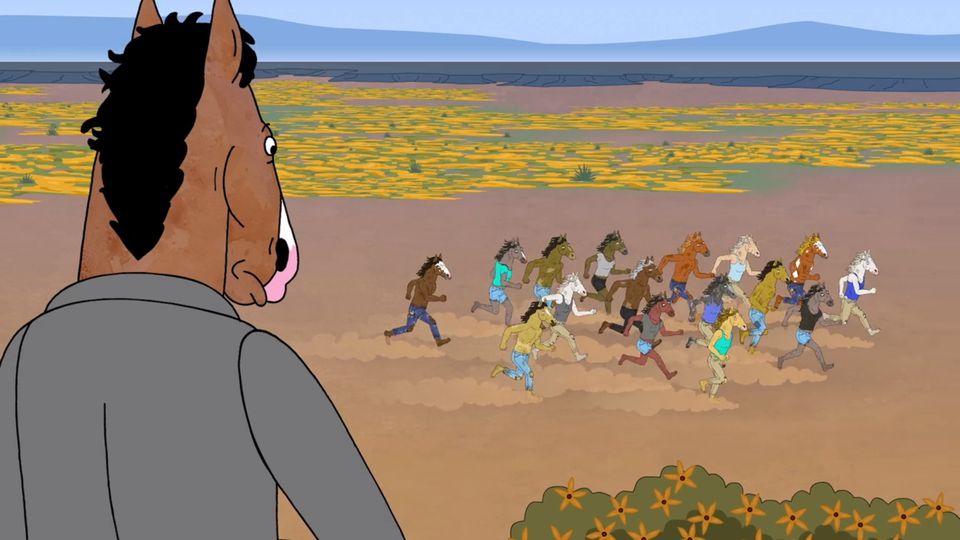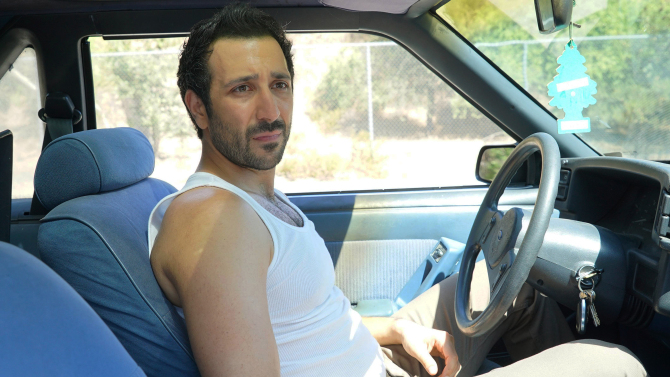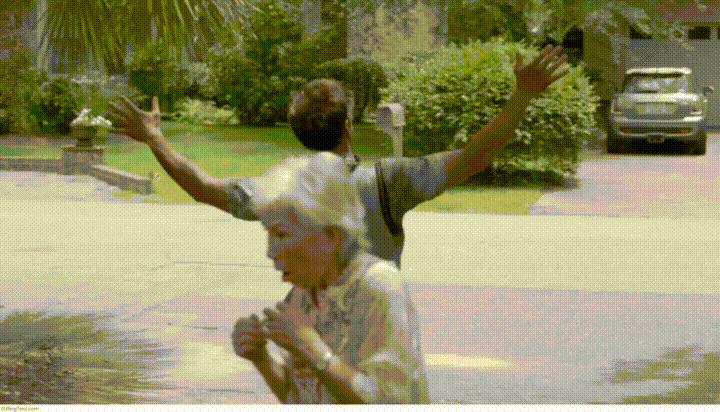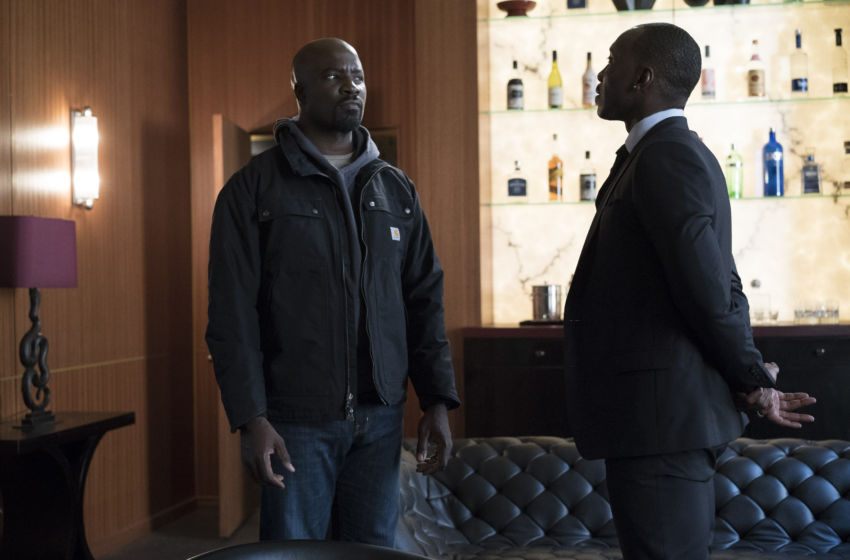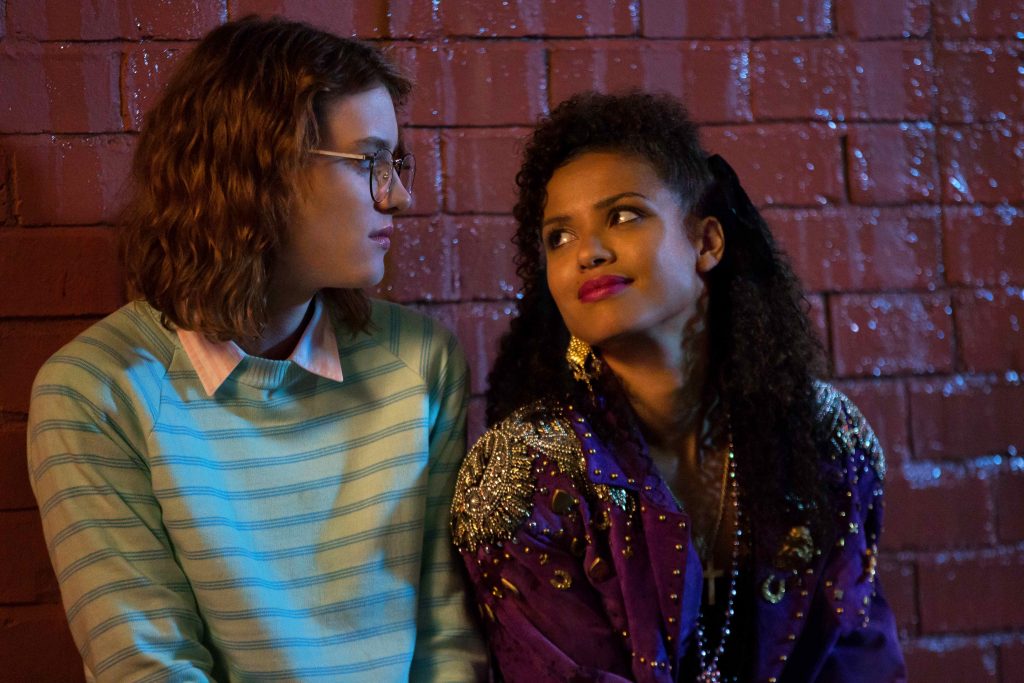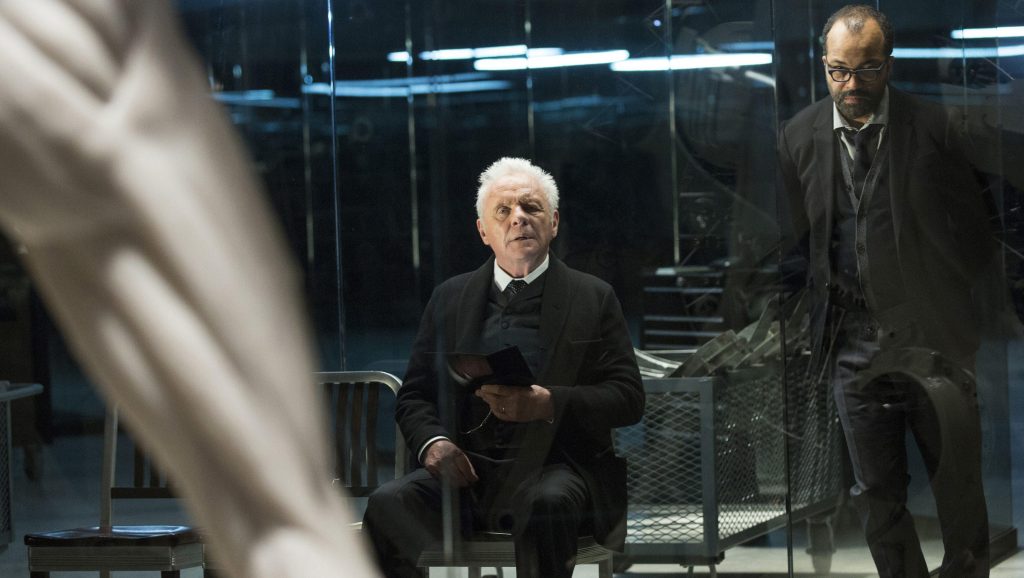Every year, it feels like there are more and more “can’t miss” TV series, and ironically, more and more of them keep slipping through the cracks. We race to binge, stream, and catch up on every hot new show, to avoid spoilers and to keep in the cultural zeitgeist. But because of this cultural shift, wide swaths of TV have begun to blend together in a shapeless, hard-to-recall mass.
This year, our contributors focused on the best individual episodes that aired or streamed. In an age of powering through dozens of hours of shows, a specific half hour or hour installment that sticks with you is a rare achievement. These episodes represent masterful work from start to finish, both in context of the larger shows and standing alone.
10. American Crime Story: The People vs. OJ Simpson, “The Race Card”
The People vs. OJ Simpson was standout event television in a year of solid event television, if only because we all knew how it would end but we made a point to tune in each week. Sometimes it felt like we were watching the trial unfold in real time, and sometimes it felt like a weird Halloween party, but it was always compelling.
The show had no intention of changing anyone’s opinion on OJ, but it was at its best when it provided context around the case and why people reacted the way they did. This episode, as the title implies, shows how the prosecution and the defense grappled with the question of race in building their case. It’s the first time we see Marica Clark (by way of Sarah Paulson) stoop to the defense’s level by goading Chris Darden to get involved for the optics. But the real star of the episode is Courtney Vance’s well-deserved Emmy winning turn as Johnnie Cochran and his inner conflict over how to best handle the case while grappling with accusations of being an Uncle Tom. Vance embodies Cochran to an eerie degree, showing that he was indeed a bit of a cartoon but also far more vulnerable and aware of what was being said about him than any of us believed.
The opening scene of the episode shows a younger Johnnie Cochran dealing with police discrimination while also being an Assistant District Attorney. It ends with Detective Mark Fuhrman polishing his collection of Nazi memorabilia. It begins with a shot to the gut and ends with a shot to the gut. Perhaps no piece of dialogue better sums up the defense’s philosophy, the show, and the context of the trial than Cochran’s response to Darden’s call to be respectful to one another—“Brother, I’m not trying to be respectful. I’m trying to win.”
– David Lebovitz
9. Daredevil, “New York’s Finest”
Daredevil’s second season was, to put it diplomatically, a mixed bag. Much of this can be attributed to the uneasy relationship supernatural elements such as The Hand had existing in such a gritty, grounded show, but almost all of the bits involving the Punisher were golden – this episode being perhaps the best. The MCU’s take on the Punisher (Jon Bernthal) is probably the best, most well rounded put to screen yet—a cold-blooded badass with a moral code, but also vulnerable and unsettled about his mental state.
“New York’s Finest” finds Daredevil at its Garth Ennis-y best. The Punisher has kidnapped Daredevil and chained him to a roof, and the two argue over their different philosophies regarding vigilante justice. Such a concept sounds (and probably should be) dreadfully boring for a superhero property, but the two of them have such a natural chemistry that it makes for high stakes drama. Daredevil’s morality, fueled in part by his Catholicism, about giving people seconded chances is put at odds with Frank Castle’s intention to kill the sinner and move on to the next target. Though Daredevil is obviously the more sympathetic party, being the show’s namesake, they let Punisher make a solid enough case to throw the status quo into question.
It’s a philosophical discussion often found in comics but rarely if ever put to screen, and it translates beautifully – on some levels, it’s a better adaptation of The Killing Joke than The Killing Joke. One bad day.
Karen, Foggy, and Clare also get their chances to shine, the big highlight being Foggy calming down a hospital fight using legalese. It’s a solid setup for what becomes a good season for Foggy, as we watch him reveal how competent a lawyer he has been all along.
Also, like all the best installments of the Marvel Netflix MCU, the episode ends with a long hallway fight. If we’re being honest, Daredevil beating up pissed off bikers alone was enough to get this a top ten spot.
– David Lebovitz
8. Crazy Ex-Girlfriend, “When Will Josh and His Friend Leave Me Alone?”
Can we talk about how absolutely wild it is that the most emotionally honest show about romantic relationships and mental illness is a semi-musical on The CW? Crazy Ex-Girlfriend stuck the landing on a really solid first season, and the sophomore follow up season has been even stronger. The crux of this episode, which finds titular crazy ex-girlfriend Rebecca Bunch (Rachel Bloom) heartbroken by both on-a-pedestal hunk Josh (Vincent Rodriguez III) and put-upon love interest in waiting Greg (Santino Fontana), who wisely decides he’s had enough of this shit and left the show left West Covina to finish grad school. The genius of Crazy Ex-Girlfriend is in how is takes the standard sitcom love triangle and turns it on its head in a way that feels very genuine: What happens when neither guy wants to be with our heroine? How do you even deal with that?
Rebecca, in a fit of mania, accidentally burns her house down, decides to dye her hair blonde, and throws herself into trying to win a contest to be the spokesperson for a brand of feminine hygiene products. Bloom’s portrayal of Rebecca’s slowmo mental breakdown deftly mixes her signature pratfall goofiness with some real world heaviness as she tries in vain to avoid facing her failed relationships and herself. Speaking of real world heaviness, the episode’s secondary plot finds Rebecca’s best friend Paula (Donna Lynne Champlin) grappling with an unexpected pregnancy that threatens to sink her hopes of finally going to law school. Crazy Ex-Girlfriend approaches the subject of abortion with a sophistication TV rarely affords viewers, and Paula’s resulting feelings of abandonment when Rebecca isn’t there for her in this vulnerable moment is some unbelievably powerful stuff for a show where people break into songs like “We Tapped That Ass.” While Rebecca Bunch’s life is a hot mess shitshow, this episode demonstrates perfectly the way in which Crazy Ex-Girlfriend is a thoughtful and insightful examination of the struggle to love yourself and others.
– Max Robinson
7. Stranger Things, “The Upside Down”
Stranger Things came out of completely nowhere this year as the most talked about show, due in part to its organic, mainly word-of-mouth marketing. In this way it’s a perfect emulation of the 1980s kids-on-bikes sci-fi aesthetic it aims to achieve. The season finale of its first season (only eight episodes, making it easy to binge) is a tense affair involving the kids rescuing government experiment Eleven (Millie Bobby Brown) from the research facility while be chased down by the vicious “Demigorgon” from the parallel dimension known as the “Upside Down.”
This episode showcases the full extent of Elle’s telepathic powers, showing her crush the brains of soldiers and immoral executives as well as making the ultimate sacrifice to save her newfound friends. The finale ends on a bit of a cliffhanger as Will Byers (Noah Schnapp) seems to be developing similar powers to Elle, who also may or may not be quite deceased as we are led to believe. There’s a satisfying conclusion here but, thankfully, enough threads are open for a continuation.
– Andrew Niemann
6. BoJack Horseman, “That Went Well”
Most seasons of television are lucky to have one instant-classic episode, particularly in this streaming-dominant era when episodes are increasingly seen as chapters in a larger story. BoJack Horseman season 3 is a season of 6-7 classics, with the rest being strong connective tissue. I wish I had the time to go into all of them instead of just the one that made our list.
Some fans might find it strange that it’s this episode that clinched, above the beautiful experiment of “Fish Out of Water,” the absurd feminist satire of “Brrap Brrap Pew Pew,” or the bleak, brutal tragedy of “That’s Too Much, Man!” For me personally, “That Went Well” edges it all out because it’s not only a strong episode in its own right, but it takes all those powerful parts and arranges them into an even stronger whole. There’s a feeling that the entire season, nay, series has been building up to this, with the pain and horror of BoJack’s existence finally hitting home in a way he can no longer even attempt to ignore, no matter how much he may have changed on the surface. It’s all driven home in a single knockout punch that only Nina Simone could help deliver; the final image of this episode might very well haunt me for the rest of my life.
– Chuck Winters
5. You’re The Worst, “Twenty-Two”
You’re The Worst has experimented a fair amount, in terms of both construction and tone, over the course of its three seasons, but “Twenty-Two” is probably the most ambitious break from formula yet. It takes what could’ve easily been an average “side character spotlight” episode and elevates it to a masterpiece.
“Twenty-Two” is clever right from the start, showing us events we’ve already seen in the previous episode, but from Edgar’s perspective. Small, amusing non-sequiturs get full, painful context. Lines we didn’t bat an eye at last episode become harsh barbs when filtered through Edgar’s PTSD and depression. Both Desmin Borges’ stellar performance and some deft cinematography and sound editing make this episode a must-watch.
Season 3 of You’re The Worst never quite matches the heights of season 2, but there are some shining moments, and this episode stands with the best of any “dramedy” shows of the era.
– Joe Stando
4. Vice Principals, “Circles”
Jody Hill’s Vice Principals is, by design, an extremely horrifying comedy about two incredibly unpleasant men who bond over a scheme to get a more qualified African-American educator fired from the small town high school principal job they both desperately covet. Danny McBride’s power-tripping man-child disciplinarian Neal Gamby is the show’s true lead, and it’s with “Circles” that we finally get a glimpse into human Starscream Lee Russell (Walton Goggins) as more than just a second banana foil for McBride to play off of.
While effortlessly manicured and coiffed at work, Russell finds himself bullied by an aggressive neighbor whose transgressions start at refusing to turn his boombox down and devolve into racist harassment and threats aimed at Lee’s Korean wife and mother in law. That Russell, who routinely makes racist remarks about school principal Dr. Belinda Brown behind her back, now finds his family similarly victimized silently speaks volumes about the complex nature of ingrained bigotry. Russell finally fights back, first with a cowardly call to the police and later—in the best single two minutes of television this year—by destroying his foe’s stereo with a pillowcase full of La Croix. Naturally, he gets his ass kicked, but is saved thanks to the arrival of Neal Gamby, who in the episode’s B-plot learns about conflict resolution. Naturally, Gamby solves this particular problem by punching a man in the face with a pair of brass knuckles so hard he passes out. Vice Principals doesn’t really shy away from the fact that Gamby and Russell are pretty nasty pieces of work, but “Circles” posits that even total scumbags need friends.
-Max Robinson
3. Luke Cage, “Manifest”
It’s hard to talk about Luke Cage on an episode-by-episode basis because the entire series is meant to be watched back-to-back and stand on its own. For my money, the best standalone episode in this Marvel Netflix series is its midway point, centering mainly on the backstory of its villains Eli “Cottonmouth” Stokes (Mahershala Ali) and his partner Mariah Dillard (Alfre Woodard).
Dillard had mainly been a background threat against Luke Cage (Mike Colter) cleaning up the streets of Harlem, using her political maneuvers and street contacts to attempt to take Cage out. However, this episode begins her turn from hypocritical politician to stone cold murderer with her snapping on Stokes near the end of the episode. Woodard’s Mariah is the breakout star of the series and the show is as much about her character’s rise to power as it is about Luke. Also, Diamondback (Erik LaRay Harvey) makes his amazing debut at the end of the episode firing a super-powered bullet into Cage’s back while quoting a line from The Warriors. I can dig it.
– Andrew Niemann
2. Black Mirror, “San Junipero”
The illustrious Chuck Winters has already gone so deep on “San Junipero” that writing about it almost feels like a fool’s errand. But in addition to referring you to that, I want to focus on what set this episode apart from literally every other Black Mirror to date.
Black Mirror is Charlie Brooker’s singular vision of technology and society. More often than not, it ends up pessimistic and overly facile, with a fair amount of false equivalencies and reductive takes thrown in. Mallory Ortberg’s “what if phones… but too much” boilerplate review often applies. In “San Junipero,” for the first time on the show thus far, we’re shown a way in which the escalation of technology can bring hope and love, instead of sadness.
While bits of “San Junipero” are still sometimes a little easy, it’s such a welcome change of pace from the show’s usual smug attitude, I can’t stay mad at it for long. 2016 was rough and 2017 looks to be rougher, so here’s hoping we get a little more optimism like this.
– Joe Stando
1. Westworld, “The Original”
People are calling Westworld the next Game of Thrones. I call bullshit; Game of Thrones didn’t get off to a start this strong.
The series itself might have some shortcomings, particularly as it approaches characterization and character empathy in a more experimental way by necessity. Still, “The Original” might be one of the best pilots ever made; it’s a deceptively heavy hour-and-a-quarter that asks some deep, probing questions and sets up an intricate mythology. Yet it delivers a mostly self-contained narrative with satisfying thrills and a lot of jet-black laughs.
It’s the kind of episode that rewards multiple rewatches, not just because it reveals new information on each pass. Certain sequences, like the violent saloon robbery—set to an Elmer Bernstein-ized “Paint It, Black” (the score as a whole is some of Ramin Djawadi’s best work)—and its twisted punchline never get old. And if you like acting, it’s always exciting and unnerving to see virtual unknown Louis Herthum out-creep a very game Anthony Hopkins in their scene together.
With “The Original,” Westworld stepped up to the plate and pointed to the rafters. Whether it followed through may depend on who you ask—personally, I think it more than delivered—but the actual shot call was an enriching experience in its own right.
– Chuck Winters


